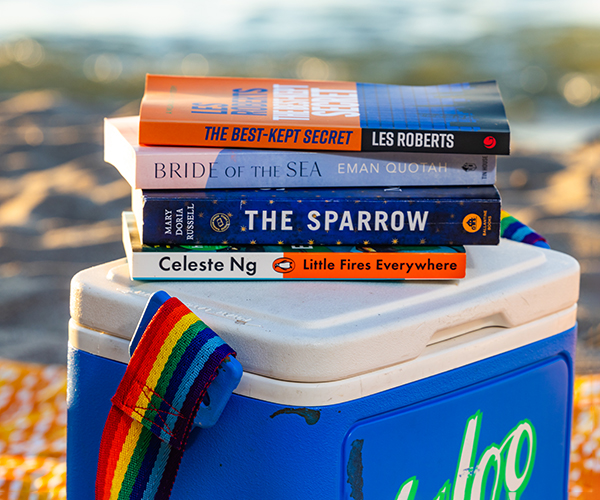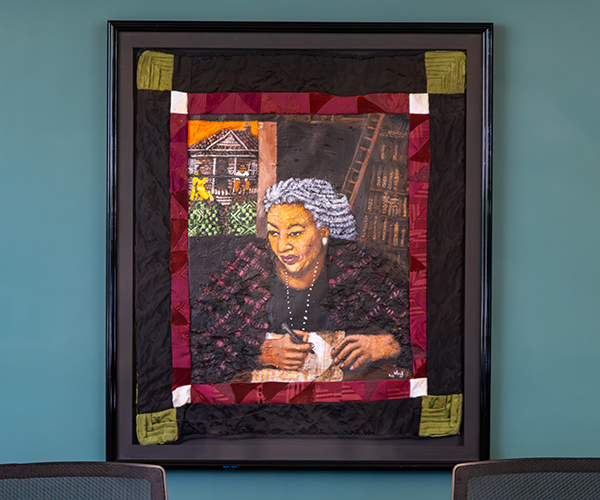Excerpt introduction
What’s it like when your son or daughter leaves home to fight a war? Forty-five northeast Ohio mothers of U.S. service men and women tell about the emotional roller coaster they experienced in a new book—Love You More Than You Know: Mothers’ Stories About Sending Their Sons and Daughters to War (softcover / $14.95 / 240 pages), which is excerpted below.
The book is available at Northeast Ohio bookstores, Discount Drug Mart, and from Amazon.com.
Excerpted from the book Love You More Than You Know: Mothers’ Stories About Sending Their Sons and Daughters to War © 2009 by Janie Reinart and Mary Anne Mayer. All rights reserved. This text may not be reproduced in any form or manner without written permission of Gray & Company, Publishers.
For more info about the book
http://www.grayco.com/cleveland/books/10553
Purchase on Amazon.com
http://www.amazon.com/exec/obidos/ASIN/159851055X/clevelandbooks
Gray & Co., Publishers
http://www.grayco.com
The Year Our Children Went to War
Mary Anne Mayer
Then, in September of 1999, I came home from school to find a Marine recruiter sitting at my kitchen table with my son. Almost instinctively I knew this would change the course of all the plans we had for him—Stan, our sensitive, unassuming, yet erudite son who loved to write and draw, visit the art museum, and watch Inside the Actors Studio with me. I was so overwhelmed, I could not speak. I was choked up, and the recruiter, embarrassed for me, apologized and said he’d return at a later time. Return he did, and, despite my protests, Stan signed up for the Marine reserves.
Sending Stan to boot camp was like sending Daniel into the lions’ den. Three months later, in the sweltering heat of Parris Island, he was recognized as the honor grad of his platoon. We could not have been more proud. Six foot four, square-jawed and broad-shouldered, he looked like a Hollywood poster for the Marines.
Juggling college and the Marines, Stan was able to do it all. “Okay,” I thought, “this business of being a Marine isn’t so bad.” And then, on September 11, 2001, all hell broke loose, and I got a reality check.
Every time units were sent to the Middle East, Stan felt cheated, while I breathed a sigh of relief. Two years later he held his ill, ninety-three-year-old grandmother and said, “Don’t cry, Grandma, it looks like my unit won’t ever go over.” Three months later she passed away, and his unit received orders for Iraq. I have no doubt that she and my dad (who passed away before my mom) watched over him during his tour.
I cannot possibly describe what it feels like to send your child to war. It’s a bizarre explosion of fear and pride, helplessness and strength, anger and acceptance. Surrendering, I placed Stan in God’s hands, and asked our parish priest to bless him before he left for Iraq. As I placed the blue star in our window, I finally understood the hearts of all the mothers who had gone before me throughout history.
“Mom, don’t be sad. This is what I have prepared for. This is why I am a Marine.” As he said this to me the night before he left, I remembered the ten-year-old Stan who was so drawn to the idealism of the Knights of the Round Table, and I feared that the hell of war would forever change him.
On a bleak winter’s day in January, we put on brave smiles and held flags and signs as the buses drove our sons to the airport. I remember that when the buses were out of view, mothers who were strangers only minutes ago stood together on the side of a slushy road in Brook Park, Ohio, embracing one another with one thing in common—helplessness. Later, that night, while making a cup of tea, I sobbed when I saw that the sugar bowl was empty.
“Mom,” Stan said, calling from California, where the Marines prepared for war, “don’t worry about me. I’m in a special unit called ‘MAP.’ I drive the brass around to their meetings—kinda like the Secret Service for the military.” I felt as though a huge weight was lifted. I mean, how often does one hear of officers being killed? What he did not say was that MAP also stood for Mobile Assault Platoon—a specialized unit of handpicked Marines who executed offensive missions against the insurgents. What I did not know was that while I was teaching junior high, or mopping the floor, or grocery shopping, Stan was watching a good buddy lose his leg to an IED (improvised explosive device) just one Humvee ahead of his. Or that he was writing a war journal, chronicling the conversations of his brothers sometimes days before they got wounded or killed. What I did not know was that rounds of ammo whizzed by his helmet on any given day, and that before each mission, the men in Stan’s Humvee would recite the 91st Psalm because they were always in harm’s way.
Our rituals get us through each day. I left Stan’s leather jacket hanging on the back of the dining room chair—just as he had left it. There was always a vigil candle on our mantel, with Stan’s picture carefully placed between a framed print of The Good Shepherd and a photograph of my mom and dad. No matter what I was doing or where I went, an enameled yellow ribbon with the Marine insignia graced my left shoulder. We wound a giant yellow ribbon and bow on an ancient oak in my daughter’s yard. Alex, my two-year-old granddaughter, would frequently yell at their resident squirrel to leave it alone. “Go away, Mr. Squirrel, that’s Uncle Stan’s bow!” I began attending daily mass and saying the rosary for all the soldiers. Who would better understand the suffering of our troops than Mary, who stood and watched the Passion and death of her son?
“God, let Your will be done. I got no control here.” That was how Stan and his brothers had begun to pray—not to be kept safe from harm but to do His will. I was more selfish with his life. I wanted him! As I thanked God that Stan was spared, my heart cried for those mothers who, on Mother’s Day, received the news that their sons were badly wounded or killed at Haditha. That Sunday afternoon, May 8, shaken by the reality of war, my family made our annual Mother’s Day visit to the cemetery. As I touched the cold marble marker, I whispered, “Thanks, Mom and Dad.”
I wish I could say that the war went away after May 7. But, tragically, the following five months continued to bring the war home to Columbus and Cleveland, with forty-nine of our brave sons having made the ultimate sacrifice as members of the 3rd Battalion, 25th Marines. My hands froze on the steering wheel and my legs began to shake when I heard on the radio that fourteen Marines from Stan’s unit had been killed on August 3. We rushed home and sat by the phone, praying that it would not ring and fearful of the sound of cars coming up the driveway. In the weeks that followed, funeral homes swelled with people paying their respects to more of Stan’s fallen brothers. Funeral entourages with honor guards stretched for miles, and both the young and old stood at silent attention as the hearses passed by.
By the end of August, I had no more tears, but the solitary image of the mother of one of Stan’s fallen brothers will forever remain in my mind. Grief-stricken, she sat on a stone bench in the garden of St. Albert the Great Church, in front of a statue of the pietà—in front of Mary holding the lifeless body of her son in her arms.
Under the blue skies of a warm October day, the members of the 3rd Battalion, 25th Marines returned home to a hero’s welcome in Brook Park, Ohio, as hundreds of people lined the streets—a testament not only to those who returned home, but also to those who did not. The auditorium where families and friends gathered pulsated with excitement as we anxiously awaited our sons’ arrival. I felt physically lighter than air, and when I finally reached Stan, I wanted to hold him forever.
In the ensuing months I would sometimes just look at him while he slept—just like I used to do when he was born, just making sure that he was really there, that he was all right. Lying there, he looked the same. The physical wounds of war had healed. But he didn’t do a lot of sleeping. He seemed distant. The war did not end with the October bus ride. Talking about mundane things was awkward for me, yet that was all that Stan wanted to talk about. Stan became a spokesperson for his unit, and, little by little, through his interviews and speaking engagements, published magazine articles and the photographs he had taken in Iraq, I began to get a clearer picture of the war. But I needed only to look into his eyes to know that there are stories I will never hear.
While Christmas shopping that year, I came upon a painting of an angel embracing a soldier with his wings. The 91st Psalm was superimposed in the desert background. “Could you please wrap this up for me?” I asked the clerk, as I fought to hold back tears. This Christmas gift for Stan could say what I could not put into words. This angel could bridge the awkward gap I felt, because I knew that, though I was Stan’s mother, this war was something that on many levels I could not share with him. This beautiful psalm, sung thousands of years ago near the same hills where the war was now being fought—this, Stan would understand.
We are all changed forever by events larger than ourselves. We must go on, but we will never forget the year our children went to war.
Mary Anne Mayer became an Army wife when she joined her husband, Stan, at the Arctic Test Center in Fort Greely, Alaska. She has degrees in theater and secondary education, and she teaches art, religion, and writing, and co-directs plays, in junior high school. She and Stan have three children and delight in being grandparents.



